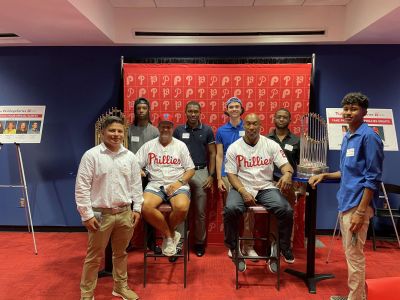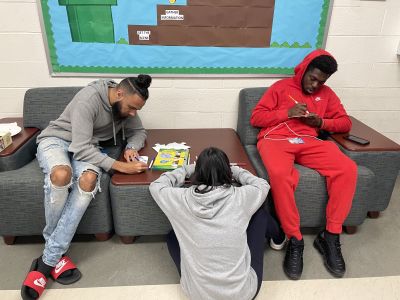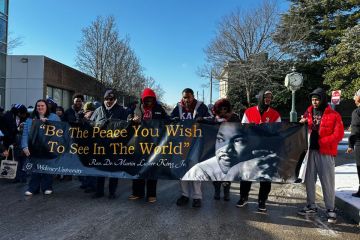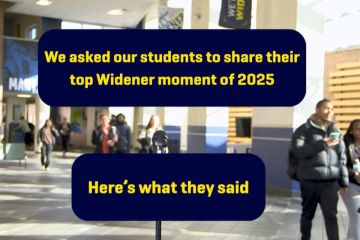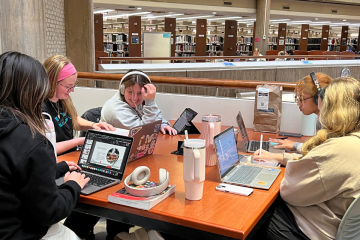Specialty Housing Fosters Community and Belonging
Garrett Kluthe ’26 was searching for a campus housing option where he could connect with fellow engineering students and benefit from their shared experiences.
Drew Nutt ’26 was looking for a home, not just a place to sleep after a long day of classes.
Valleri Freibauer ’26 wanted to live with people who understand what it’s like to be part of the LGBTQ+ community and who would accept them without question.
All three of these first-year students, and many others like them, have found that sense of community-within-a-community through Widener specialty housing.
The university offers a range of housing options – from traditional residence halls, to suite and apartment-style living, to fraternity and sorority houses. Within many of these options, Widener has built and fostered specialty communities to further promote a sense of belonging and camaraderie.
Kluthe joined a Living Learning Community (LLC), a unique living experience that brings together people based on shared academic majors, interests, or themes. Students live together in designated residence halls or sections of residence halls.
LLCs also bring academics into the residential space through on-site classes, exclusive programming, and opportunities to interact with faculty and administrators. The LLCs also have a required course section that residents take, bridging the learning in the classroom with the co-curricular experience.
“Day one we already had a group forming. It really has lived up to what I expected and probably more,” said Kluthe, a civil engineering major who is living in the Engineering LLC.
This fall, Widener added to the list of LLCs, introducing the 1821 Experience LLC. It takes a successful pre-orientation program and extends and transfers it into the residential space.
Also new to campus housing this year is Lambda House, a gender inclusive residence for members of the LGBTQ+ community. That’s where Nutt, Freibauer, and others have found their place.
It’s really like an instant family. It’s been home, and I’ve felt very comfortable there. It’s nice to have that safe space. It’s important for people to have that. — Drew Nutt '26, an accounting major living in Lambda House
Along with feelings of built-in community and belonging, specialty housing also provides some very tangible benefits to student success and retention.
The LLCs
Evidence shows that students pursuing rigorous academic programs, like engineering or nursing, have a greater ability to persist when living in communities with students of the same major, said Sarah Williamson, assistant dean of students for residence life.
“There’s a ‘we can do this together’ mentality,” said Williamson. “Students can lean on each other as they work through their first year in similar academic courses.”
That’s something first-year nursing major Anna Greydanus has felt living in the Nursing LLC.
We have formed study groups in the lounge. We all have tests at the same time, and we help each other out. I’m really happy with my choice to live in the LLC. — Anna Greydanus '26
The LLCs offer students close interaction with faculty, and several halls have faculty satellite offices so professors are accessible right in the residential space. There are also RAs (often previous community members), who are selected by faculty members to serve as a peer support.
The LLCs also provide special programming and networking opportunities. This year, members of the Business LLC attended the Philadelphia Phillies College Nights series at Citizens Bank Park. The event included a panel discussion with Phillies industry professionals, a networking hour with Phillies staff and with students from other area colleges, and a chance to stay to watch a game.
“It’s a cool dynamic knowing people in your classes are literally next door,” said Vinny Csercsevits, a mechanical engineering major who lived in the Engineering LLC his first year and now serves as its resident assistant.
Last year, Csercsevits took part in a résumé workshop hosted by the LLC. It helped him craft his credentials specifically with engineering in mind, and that résumé helped him land his current co-op.
New to the LLC offering this year is the 1821 Experience. For several years, Widener has offered the 1821 Experience pre-orientation program, which enabled first-year student participants to move to campus a few days before everyone else, offering a less intimidating way to begin college and a chance to get a head start on their peers with earlier access to resources and support.
“Often times we attract students who might be anxious about starting college. Participants are also diverse in a number of different ways, including first-generation students as well as students of color and students who identify as LGBTQ+ or are neurodiverse,” said Kortne Smith, assistant director of the Multicultural Student Affairs Office, who oversees the 1821 Experience program and LLC.
While the bonds that students formed during the pre-orientation program often endured beyond the start of the school year, organizers felt there was a more intentional way to continue the work of 1821 Experience.
The LLC is doing just that. Orientation program participants have a chance to live together where they can “continue to foster those bonds,” said Smith, who has a satellite office in the LLC.
“It’s community,” said Smith. “We have the larger, more full-bodied Widener community. But so much of what makes it rich and unique is the intimate communities we experience. Students feel they have space and can find their people.”
LLC residents are part of the 1821 Experience First Year Seminar and participate in programming and workshops on leadership and other topics.
Isis Williams ’26, a nursing major, could have lived in the Nursing LLC or the Honors LLC. But she chose 1821 Experience as “a chance to meet different people of different majors. It helps develop relationships and confidence and I would definitely recommend the pre-orientation program and the LLC.”
Gender Inclusive House
Widener has previously offered gender inclusive residential spaces in apartment and suite-style housing. But hearing from students, the university saw a need to expand the offerings.
Lambda House, the gender inclusive residence, is the result. With room for 18 students, the house is designed as an affirming space for LGBTQ+ students. It offers gender inclusive bedrooms and bathrooms. Residents of any class year can live there.
“If you don’t live in the house you will still find people accepting of you. And even if you don’t live here, you can still come over and still form those connections and meet people,” said Christina Giska ’23, the house’s resident assistant. “There are people who can adapt to anyone, but there’s people who want to be around someone they share similarity with.”
The house features a satellite office for Sage Milo, the university’s DEI program manager, and a meeting space for the Sexuality and Gender Alliance student group. That space is also housing a community wardrobe, comprised of clothing donations. Students can “come and get the clothes that feel right for them,” said Milo.
Residents say that almost immediately the Lambda House was a family and a place of acceptance, something these students have not always felt in the wider world or within their own families. It’s also removed some of the angst associated with living in a traditional residential space, such as which bathroom to use or whether the people around them will use the correct pronoun.
It’s nice to know there’s people here who understand your experiences. It’s a really solid group of people I can lean on. — Valleri Freibauer ’26, a social work major and resident of Lambda House
While there are some formal programs for students, the residents have started their own traditions, including movie nights, video game playing in the lounge, and a new Dungeons & Dragons club.
“This is not just a building you’re assigned to live in. This community is more intentional. There’s a reason why they are there and specifically chose to be there,” said Milo. “They belong and make an impact. It gives them confidence.”
As members of a new housing option on campus, these residents feel a sense of ownership in the house and the ability to shape its future.
“I definitely feel like I have some kind of say, which is really cool. And it’s cool to think decisions we’re making, and things we’re trying to do, will last longer than us,” said Giska.

